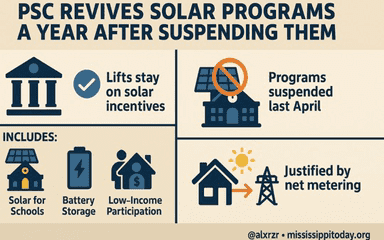Mississippi News
Jackson water crisis: Reddit AMA recap
Reddit AMA recap: Jackson water crisis with Alex Rozier

After years of administrative and structural issues, the Jackson water system suffered a failure exacerbated by the flooding of the Pearl River and leaving thousands of citizens with little to no clean water for a week. Amidst that, the city was already under a boil water notice that is no longer in effect.
Alex Rozier, Mississippi Today’s data and environment reporter, answered questions on Reddit about long-term plans to address the city’s water issues, the One Lake project and more.
Click to jump to a specific question:
Q: I have a question regarding the long-term “plan” to fix the water that everybody says is necessary to get funding, but depending on who you ask: either nobody has taken the time to put it together over all these years, or it exists you just can’t see it yet.
Who does the city have putting this plan together? I really hope it’s someone with actual technical expertise, and not just delegated city council members.
And I actually read that 45-page report Lumumba keeps pointing to as a plan that is referenced in the article you link. A list of currently ongoing projects and a “wishlist” from each councilperson is not a “long-term plan”, the majority of it isn’t even about water. I really hope they didn’t pay AJA Management much for that piece of paper. Might want to check their connections to the city government.
A: It’s a great question, and I think the confusing part about it is that the city has a number of “plans.”
The 45-page report you talked about was done by AJA, SOL and Neel Schaffer, published in 2020. That’s probably the closest thing we’ve seen to plan during Mayor Lumumba’s administration, but it’s unclear how closely the city has been following it, which is something for us to follow up on. That accounts for about $80 million in water spending over five years.
But there’s another — seemingly more comprehensive — plan that Jackson crafted with the EPA, and which, according to the city, shows the $1 billion spending need that the mayor keeps mentioning. The issue is that plan is hidden behind a court-ordered non-disclosure agreement.
One thing the mayor keeps bringing up is the cost of making a plan; the 45-page document cost the city $200k to produce, he said. He argues that it’s not worth it to spend money in order to keep updating the city’s plans if the state/fed governments aren’t going to fund those plans.
The questions I have about all this are: how much did the city “lacking” a plan prevent the state/feds from sending money? Did they ever offer feedback as to what the plan is missing?
While it’s fair to say the city hasn’t been super clear about what its plan is, I’m also skeptical of state/fed officials saying that’s why they haven’t been able to better fund Jackson.
Q: [Are there] any other cities in the state on the brink of having this happen?
A: As far as cities’ drinking water, I’m not positive about all of them, but I do know Greenville is having some issues.
From what I can tell, the more widespread issue is with rural water services. Experts will tell you that Mississippi, for its population size, has way, way too many local water governing bodies, many of which are too small to fund repairs, and don’t have the required expertise. The state has 1,200 public water systems, 70% of which serve a population of 1,000 or less.
Add on the fact that a relatively large portion of MS is still on private wells.
The solution, those experts would say, is to consolidate. That can be tricky when you’re trying to get one water authority that’s doing well to join with another that’s in some debt. But I believe there is federal money available to help push those mergers through.
READ MORE: Federal funds both ‘huge’ and ‘not near enough’ for Mississippi’s rural water problems
As far as cities go, I’m more aware of their wastewater issues, which are very widespread (I wrote about that recently here, although that story doesn’t include the Coast, which is definitely no exception).
Q: Mayor Lumumba sued Siemens for $225 million back in 2019. The city settled for only $90 million. Only $14 million of the settlement went into the water/sewer system and $30 million went to attorneys. 1). Can you list out where all the settlement money went? 2). Can you list who the attorneys were and their area of expertise?
A: I haven’t personally reported on the Siemens issue, but the Clarion Ledger did a good story breaking that down here.
Like you said, $30 million went to attorneys; $46 million was split between the city’s general fund, enterprise fund, and paying down city debt. About $10 million was earmarked for meter and billing fixes. WLBT also has a recent story on this.
Q: I read where the city hadn’t been collecting water bills. Is this true? Why?
A: A lot of that goes back to the Siemens issue mentioned in the other question about the faulty meters, so the city can’t read how much water people are consuming correctly. Some of that is the cutoff moratoriums that have been on and off the last few years.
Overall, as a recent EPA report showed, about half of the water Jackson puts out is “nonrevenue,” either because of billing issues or water getting lost due to leaks in the aging pipes.
Jackson is rolling out new meters, which it says it’ll be finished doing by next March. Fixing the billing issue would be a huge funding boost — as of that EPA report, Jackson had lost 32% of its water revenue because of the broken meters.
But even after the billing is fixed, there’s still a long-term question of how a city where 1 in 4 live below the poverty line, and where the population has dropped 20% in the last 40 years, can afford to keep its infrastructure running. A lot of federal money is coming into Jackson, but it’s not near the billion dollars the mayor claims Jackson needs.
Q: My question is about the Ross Barnett Reservoir and its effect on Jackson wastewater management and flooding.
I saw a passing reference recently to a debate about building another lake near Jackson (possibly as a new catchment area at the Rez, the story wasn’t clear). Apparently, hydrologists were saying this would be necessary in any case to control flooding, but this was nixed by the state government over funding and objections from people further down the Pearl River. Didn’t say who was objecting or why.
Aside from the other questions of mismanagement, do you think the state’s decision not to build this second lake has made the situation in Jackson and the surrounding area worse? Is it possible that another catchment area at the Rez would have reduced the strain on the OB Curtis plant?
A: I think you’re talking about the One Lake plan, which is more about flood control (and recreational benefits) than drinking water/wastewater. Although I am curious to find out if that plan would do anything about the huge amounts of untreated wastewater flowing into the Pearl.
If you’re interested I did a kind of long story about the project in 2020.
READ MORE: ‘It’s been slow moving’: The debate over One Lake comes to a head 40 years after historic flood
The latest with One Lake is that the Army Secretary is reviewing a proposal for it, and then it will go back out for public comment.
READ MORE: Feds to spend $221 million on One Lake project, Army Corps announces
Q: What will the MDEQ or MSDH do about the reoccurring sewage excursions into the streets and Pearl River?
A: On the state level, that falls on MDEQ; MDEQ and EPA are in charge of making sure Jackson is implementing the measures outlined in the 2013 consent decree, which, because of funding and staffing issues, the city is not doing. It’s estimated that it’ll cost $945 million to make the upgrades required in the consent decree. Jackson is planning to use ARPA money on this, but that’ll be a small amount of the total needed.
I’m hoping to do some more reporting on this soon, but in the meantime these are a couple of helpful links if you’re interested in following:
READ MORE: Our continuous coverage of Jackson water
This article first appeared on Mississippi Today and is republished here under a Creative Commons license.
Mississippi News
Ole Miss women get pair of double-doubles and roll to 83-65 March Madness win over Ball State
SUMMARY: Mississippi coach Yolett McPhee-McCuin found solace in returning to a different arena in Waco, Texas, following a disappointing previous tournament experience. The No. 5 seed Ole Miss Rebels redeemed themselves with an 83-65 victory over 12th-seeded Ball State in the NCAA Tournament’s first round. Starr Jacobs led the Rebels with 18 points and 11 rebounds, while Kennedy Todd-Williams and Madison Scott each scored 15 points. Ole Miss dominated rebounding, leading 52-32, and will face fourth-seeded Baylor next. Coach McPhee-McCuin noted the team’s evolution since their last visit and the significance of playing in Texas, where Jacobs feels at home.
The post Ole Miss women get pair of double-doubles and roll to 83-65 March Madness win over Ball State appeared first on www.wjtv.com
Mississippi News
Events happening this weekend in Mississippi: March 21-23
SUMMARY: This weekend (March 21-23), Mississippi offers a range of exciting events. Highlights include Hal’s Marching MALfunction Second Line Stomp and Jessie Robinson’s blues performance in Jackson, as well as the Natchez Food & Wine Festival and the Natchez Little Theatre’s production of *This Side of Crazy*. There are also numerous exhibitions like *Of Salt and Spirit: Black Quilters in the American South* in Jackson and *Gold in the Hills* in Vicksburg. Other events include the 48th Annual Crawfish Classic Tennis Tournament in Hattiesburg, karaoke nights in Laurel, and a variety of family-friendly activities across the state.
The post Events happening this weekend in Mississippi: March 21-23 appeared first on www.wjtv.com
Mississippi News
Events happening this weekend in Mississippi: March 14-16
SUMMARY: This weekend (March 14-16) in Mississippi offers a variety of events. In Jackson, iconic saxophonist Boney James performs at the convention center, while the JXN Food & Wine festival showcases culinary talents. The LeFleur Museum District hosts a “Week of Wonder,” and several exhibitions, including “Of Salt and Spirit,” celebrate Black quilters. Natchez features the Spring Pilgrimage tours, a reenactment of Annie Stewart’s story, and a St. Patrick’s Day celebration. In Hattiesburg, comedian Rob Schneider performs, and various events like a St. Patrick’s Day pub crawl and a talent show will take place throughout the area.
The post Events happening this weekend in Mississippi: March 14-16 appeared first on www.wjtv.com
-

 Mississippi Today1 day ago
Mississippi Today1 day agoPharmacy benefit manager reform likely dead
-

 News from the South - Alabama News Feed6 days ago
News from the South - Alabama News Feed6 days agoSevere storms will impact Alabama this weekend. Damaging winds, hail, and a tornado threat are al…
-

 News from the South - Alabama News Feed6 days ago
News from the South - Alabama News Feed6 days agoUniversity of Alabama student detained by ICE moved to Louisiana
-

 News from the South - Oklahoma News Feed4 days ago
News from the South - Oklahoma News Feed4 days agoTornado watch, severe thunderstorm warnings issued for Oklahoma
-

 News from the South - Kentucky News Feed6 days ago
News from the South - Kentucky News Feed6 days agoA little early morning putting at the PGA Tour Superstore
-

 News from the South - Virginia News Feed6 days ago
News from the South - Virginia News Feed6 days agoYoungkin removes Ellis, appoints Cuccinelli to UVa board | Virginia
-

 News from the South - Florida News Feed7 days ago
News from the South - Florida News Feed7 days agoPeanut farmer wants Florida water agency to swap forest land
-

 News from the South - Georgia News Feed4 days ago
News from the South - Georgia News Feed4 days agoGeorgia road project forcing homeowners out | FOX 5 News













































